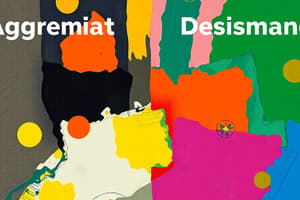Podcast
Questions and Answers
In the classical model, aggregate demand and aggregate supply will __________.
In the classical model, aggregate demand and aggregate supply will __________.
intersect at the point of full employment
What did classical economists assume?
What did classical economists assume?
Prices and wages are flexible.
What is aggregate demand?
What is aggregate demand?
It is the total demand for final goods and services in an economy at a given time and price level.
What equation represents aggregate demand?
What equation represents aggregate demand?
A market demand curve is the same as an aggregate demand curve.
A market demand curve is the same as an aggregate demand curve.
Which of the following is an example of consumption expenditure?
Which of the following is an example of consumption expenditure?
The vertical axis of the aggregate demand curve represents the price level.
The vertical axis of the aggregate demand curve represents the price level.
The total of all planned expenditures in the entire economy is __________.
The total of all planned expenditures in the entire economy is __________.
One reason that the aggregate demand curve is downward-sloping is because a higher price for domestic goods results in __________.
One reason that the aggregate demand curve is downward-sloping is because a higher price for domestic goods results in __________.
There is an inverse relationship between the price level and the quantity demanded of goods and services.
There is an inverse relationship between the price level and the quantity demanded of goods and services.
As the domestic price level rises, the demand for imports increases.
As the domestic price level rises, the demand for imports increases.
If the price level increases, then net exports, assets, government spending, and household wealth all decrease.
If the price level increases, then net exports, assets, government spending, and household wealth all decrease.
What does the aggregate demand curve (AD) show?
What does the aggregate demand curve (AD) show?
Flashcards are hidden until you start studying
Study Notes
Classical Model of Aggregate Demand and Supply
- Aggregate demand and supply intersect at full employment in the classical model.
- Equilibrium price level and real output are established where aggregate demand meets aggregate supply.
Assumptions of Classical Economists
- Classical economists believe prices and wages are flexible.
- Production generates income sufficient to create demand for all goods and services.
Aggregate Demand (AD)
- Aggregate demand refers to the total demand for final goods and services at a specific time and price level.
- Equation for aggregate demand is AD = C + I + G + (X − M), representing consumption, investment, government spending, and net exports.
Aggregate Supply (AS)
- Aggregate supply is the total quantity of goods and services firms are willing to sell at various price levels within a specific timeframe.
Understanding Market vs. Aggregate Demand
- A market demand curve pertains to a specific good, while the aggregate demand curve encompasses all goods and services in the economy.
Consumption Expenditure
- Consumption expenditure includes spending on consumer durables, nondurables, and services.
- Examples of consumer expenditure include household bills and purchases like food, clothing, and appliances.
Aggregate Demand Curve Characteristics
- The vertical axis of the aggregate demand curve represents the price level in the economy.
- The total planned expenditures for a given economy is referred to as aggregate demand.
Downward-Sloping Aggregate Demand Curve
- The aggregate demand curve slopes downwards due to higher domestic prices leading to decreased exports.
- An inverse relationship exists between the price level and the quantity of goods and services demanded.
Impact of Domestic Price Level on Imports and Net Exports
- Rising domestic prices result in increased demand for imports as foreign goods appear relatively cheaper.
- An increase in price levels leads to a decrease in net exports, household wealth, government spending, and overall economic activity, reflecting movements on the aggregate demand curve.
Studying That Suits You
Use AI to generate personalized quizzes and flashcards to suit your learning preferences.




